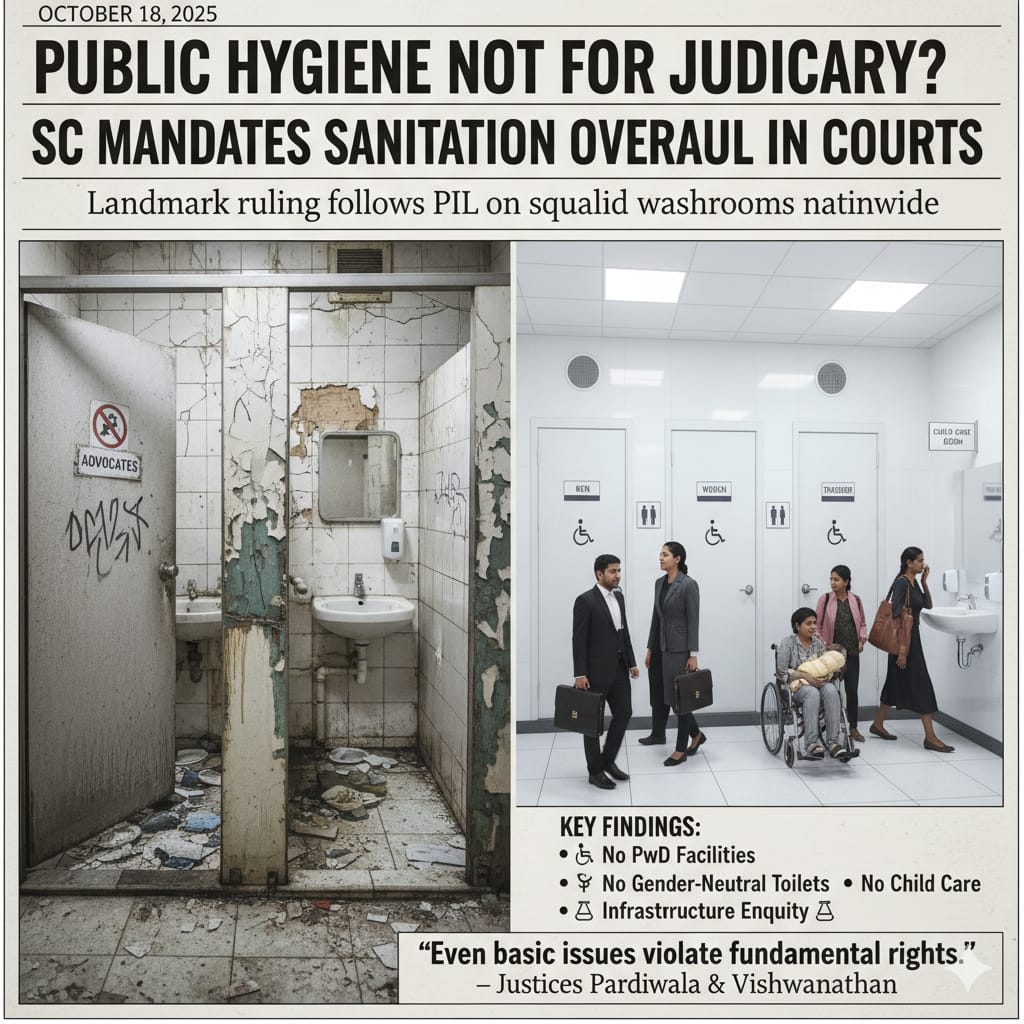Introduction
This issue roots from a Public Interest Litigation (PIL) filed by Adv Rajeeb Kalita by enforcing the provisions of Article 32 of the Constitution, seeking urgent directions for ensuring adequate and hygiene toilet facilities in all the courts around the nation for men, women, persons with disabilities (PwD) and transgender persons. The PIL has brought focus of the judiciary to a niche but grave issue, which directly violates the fundamental as well as constitutional rights of the savers of constitution. This disgraceful state of courts sanitary infrastructure, resembles the efficiency of the system by sending a message into the public that the institutions which guarantee safety of public at different levels can’t maintain their own basic safety and hygiene. The petition harboured itself on Article 21, 47, and 48A, which regulates the state to be responsible for the public health, raising of living standard, protecting environment and sanitation.
Supreme Court’s Stance
In the judgement of Rajeev Kalita vs. Union of India & Ors. (2025) the Supreme Court (SC) recognised that healthy sanitation is an integral component in the foundation of Article 21. The Court stated that:
“the availability of public toilets is an important duty of the State governments and Union Territories” and that “courts should not be places where basic needs such as sanitation are overlooked and neglected”. The judgement made a point that absence of adequate sanitation and required washroom facilities as well as amenities erodes the principles of equality, constructing a wall to achieve the goal of fair administration.
Why and Where Sanitation ?
The SC issued a complete set of guidelines and directions to all the High Courts, State Governments and respective Union territories directing:
- “Construction and availability of separate toilet facilities for males and females, persons with disabilities, transgender persons in all court premises and tribunals nationawide;
- Clear identification and universal accessibility of these facilities to judges, advocates, litigants, and court staff through appropriate signage;
- Constitution of oversight committees in each High Court comprising Registrar General, Chief engineer and other officers within six weeks to formulate comprehensive plans, conduct surveys, accessing existing infrastructure and monitor implementation;
- Allocation of sufficient funds by State Governments and Union Territories for construction, maintenance and cleanliness, subject to periodic review.”
Directing High Courts to file status reports within the time frame of four months.
On 18th October 2025, a status report was filed on behalf of all the High Courts revealed traumatic reality. The report recorded that, “the continued unhygienic state of washrooms in court complexes across the country constitutes a persistent violation of the fundamental rights and the right to dignity of all users, including judges, advocates, litigants, and staff”. The devastating conditions of washrooms even in High Courts situated in metropolitan cities is understood as a systematic and administrative failure of the allocation of funds, supervision on development of assigned work and ensuring quantity determined. It can be witnessed that the current available infrastructure has failed to meet standards required to maintain public health.
The major findings of the status report are:
- Absence of appropriate infrastructure and facilities of sanitation for the Persons belonging to Persons with Disability (PwD) category violating the provisions mandated under Rights of Persons with Disabilities Act, 2016.
- Failure to provide sanitation infrastructure of gender neutral washrooms for people belonging to transgender category.
- Lack of child care facilities for female advocates.
- Infrastructure inequity.
Conclusion
Justices J B Pardiwala and K V Vishwanathan mentioned that it is the necessity of the current hour that the directions of court are followed to make the facilities more meaningful. The Court directed the public works department to make the necessary requirements and arrangements till January 15 2025. The SC has also directed all the High Courts to file a status report in the next six months. This action of SC reflects that even the most basic and trivial seeming issues can cause violations of the fundamental rights. This judicial decision mandates accountability of executive as well as administration of judiciary towards the stakeholders of the nation, such affirmative obligations on the State guarantees healthy sanitation and hygienic public facilities within the judicial institutions.

